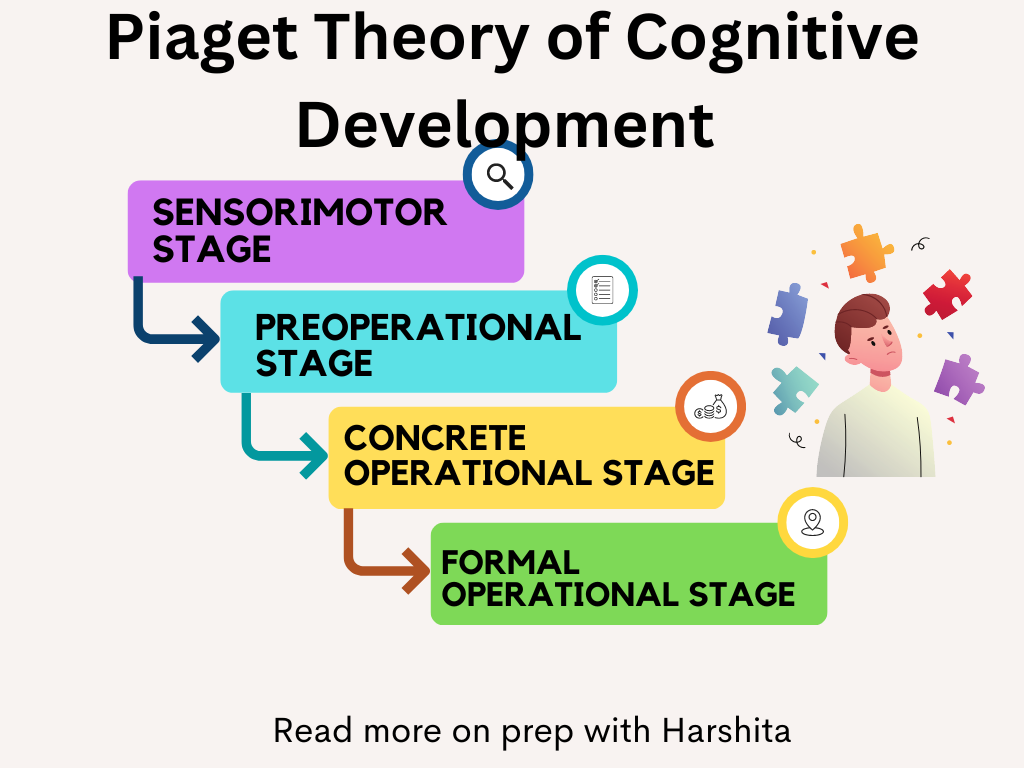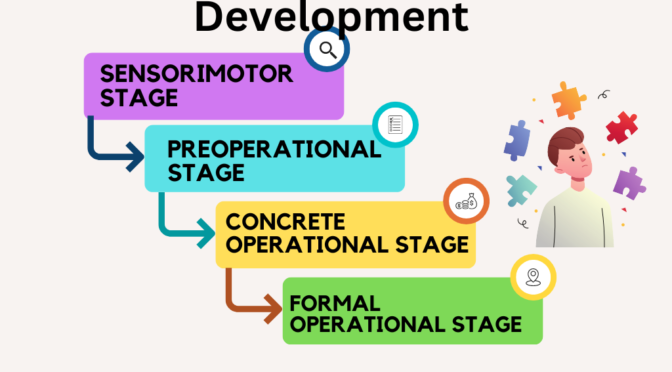Jean Piaget was a Swiss psychologist who is famous for his theory of cognitive development, which provides a framework for understanding how children learn and develop their cognitive abilities. According to Piaget’s theory, children progress through four distinct stages of cognitive development, each characterized by different ways of thinking and reasoning.
The four stages of Piaget’s cognitive development theory are:
- Sensorimotor Stage: This stage occurs from birth to around two years old. During this stage, infants learn about the world through their senses and motor actions. They develop object permanence, the understanding that an object exists even if it is not currently visible. They also begin to understand cause and effect.
- Preoperational Stage: This stage occurs from around two to seven years old. During this stage, children develop language and the ability to use symbols to represent objects and ideas. They also begin to engage in pretend play and develop a sense of egocentrism, which means they have difficulty understanding that other people may have different perspectives from their own.
- Concrete Operational Stage: This stage occurs from around seven to twelve years old. During this stage, children become more logical and can perform mental operations on concrete objects. They develop the ability to classify objects, understand conservation (that the amount of a substance remains the same even if its appearance changes), and understand reversibility (that a process can be undone).
- Formal Operational Stage: This stage occurs from around twelve years old and continues through adulthood. During this stage, individuals develop the ability to think abstractly, engage in hypothetical reasoning, and use deductive reasoning. They can solve complex problems and understand hypothetical situations.
Piaget’s theory emphasizes the importance of experience in cognitive development. According to his theory, children actively construct their understanding of the world through their experiences, rather than passively receiving information. Piaget also believed that children progress through these stages in a fixed order and cannot skip stages or regress to earlier ones.
Piaget’s theory has been influential in many fields, including education and psychology. However, it has also been criticized for oversimplifying the complexity of cognitive development and for not fully accounting for the role of culture and social influences. Nonetheless, his work has been the foundation of many subsequent theories and has contributed greatly to our understanding of how children learn and develop their cognitive abilities.



Your blog posts never fail to leave a lasting impact. Thank you for this one!
Can I simply say what a reduction to search out someone who truly knows what theyre speaking about on the internet. You positively know tips on how to convey a problem to light and make it important. More individuals need to learn this and understand this facet of the story. I cant believe youre no more popular since you definitely have the gift.
Wow, amazing blog layout! How long have you been blogging for? you made blogging look easy. The overall look of your site is magnificent, as well as the content!
I have not checked in here for some time since I thought it was getting boring, but the last several posts are great quality so I guess I will add you back to my everyday bloglist. You deserve it my friend 🙂
I know this if off topic but I’m looking into starting my own weblog and was wondering what all is needed to get set up? I’m assuming having a blog like yours would cost a pretty penny? I’m not very internet smart so I’m not 100 positive. Any recommendations or advice would be greatly appreciated. Appreciate it
I think other website proprietors should take this site as an model, very clean and fantastic user friendly style and design, let alone the content. You’re an expert in this topic!
I’m really enjoying the design and layout of your blog. It’s a very easy on the eyes which makes it much more enjoyable for me to come here and visit more often. Did you hire out a developer to create your theme? Fantastic work!
Thank you a lot for giving everyone such a remarkable opportunity to read critical reviews from this site. It’s usually so cool and jam-packed with a good time for me and my office fellow workers to visit your site the equivalent of three times a week to read through the new tips you will have. And definitely, I’m actually satisfied for the incredible secrets served by you. Certain 4 tips in this post are certainly the most effective we have all had.
Valuable info. Lucky me I found your web site by accident, and I’m shocked why this accident didn’t happened earlier! I bookmarked it.